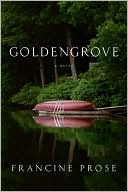Surveys show that men account for only 20 percent of the fiction market in North America and Britain. “The research is still in its early stages, but some studies have found that women have more sensitive mirror neurons than men,” reported Eric Weiner on NPR. “That might explain why women are drawn to works of fiction, which by definition require the reader to empathize with characters.” The new fiction tables at Barnes and Noble are stacked with novels built to give those neurons a formulaic workout. Servicing a woman’s monthly need to drain off her surfeit of empathy, the novelist provides a sluice, as well as guidance for those struggling with trauma or tragedy. (If empathy backs up excessively, a woman must resort to nonfiction, perhaps a memoir on managing depression during a year of empathy impaction).
 Apparently my less biologically developed neurons are firing hyper-efficiently because I was completely taken in by Francine Prose’s Goldengrove. The story begins when two sisters, 13-year old Nico and 18-year old Margaret, go rowing on the lake beside their parents’ house in upstate New York. The moment is some time after 9/11. Nico has the flashy name but the more staid personality; she gets A’s in science classes and follows ecological issues. Margaret is magnetic, imaginative, and has sex with her boyfriend Aaron, a peer-age artist whom even Margaret says is “a little nuts … Freaky. You’ve got to watch out for him sometimes.” Margaret also has a cardiac condition, and after diving off the boat, she drowns on page 18. Goldengrove is Nico’s rendition of the effect of her sister’s death on her family, with a restrained emphasis on inspiring empathy for herself.
Apparently my less biologically developed neurons are firing hyper-efficiently because I was completely taken in by Francine Prose’s Goldengrove. The story begins when two sisters, 13-year old Nico and 18-year old Margaret, go rowing on the lake beside their parents’ house in upstate New York. The moment is some time after 9/11. Nico has the flashy name but the more staid personality; she gets A’s in science classes and follows ecological issues. Margaret is magnetic, imaginative, and has sex with her boyfriend Aaron, a peer-age artist whom even Margaret says is “a little nuts … Freaky. You’ve got to watch out for him sometimes.” Margaret also has a cardiac condition, and after diving off the boat, she drowns on page 18. Goldengrove is Nico’s rendition of the effect of her sister’s death on her family, with a restrained emphasis on inspiring empathy for herself.
Nico is the main character of her own tale. But who is the narrator? One soon surmises she is speaking from a future time, since the clarity of her telling exceeds a teenager’s capabilities. In the final chapter, her profile is filled out: Married with kids, she is a geologist, perhaps now in her mid-thirties. Yet Prose has decided not to employ this vision from the year 2035(?) for special effect. Nico the mid-thirtyish geologist examines the girlhood tragedy as if turning an unanticipated specimen in her hands — a careful examination of surfaces and elements. She says that geology, more than an “attraction to earth and stones … has more to do with my lifelong worry about the planet and my lifelong desire to help stave off the end of the world.” Having staved off the pain of remembering the trauma, Nico now recalls the summer after Margaret’s death. Prose handles the compression of reined-in, matured anxiety with tactful skill, maintaining fidelity to the limits of her narrator. “It makes sense that birth and death are what people have in common,” she says. “They want to think it can teach them something they can pass on to someone else.” But people who have only birth and death in common have no other coincidental qualities in between those poles. For Nico, it is “they want to think,” not we. Throughout the telling, Nico’s tone may shift momentarily into the acerbic and darken the whole, but Prose wisely moves her in and out of that zone. The adult Nico is someone who holds herself apart. She divulges the facts, but withholds something else and lacks a certain depth. Her concerns are mainly for or about the image of herself, and there is a whiff of infantilization about it all – not about the recalled Nico who is just a kid, but in the mode of the telling. Yet the story motors on smoothly, convincingly. Shrewdly, Francine Prose has met her own standards for creative complexity, while producing a book squarely aimed at her market, including those mommies who can’t tell the difference.
Goldengrove is the name of Nico’s father’s bookstore. He tells her, “There’s this new book that’s selling really well. It’s about wizards and magic. Harry Potter for grown-ups. I never understood why so many people were buying it until … all this … this thing with your sister.” One assumes that, in Nico’s mind, her story — that is, her current perspective — represents the opposite of such escapes, but her stance is attitudinal in an almost childish way, not particularly dynamic. Prose manages to keep us engaged with Nico’s rather conventional outlook and phrasing (“The summer yawned before me, a pit of boredom and pain” or “I was still bursting into tears when anyone said the word sister”). But Nico’s way of telling mainly yields insights that strike one as clear and true. Of life with her parents, she says, “The only semi-comforting part was that we didn’t have to talk. They’d been dreaming about her, too. The mystery of death, the riddle of how you could speak to someone and see them every day and then never again, was so impossible to fathom that of course we kept trying to figure it out, even when we were unconscious.”
 Perhaps with Goldengrove, Prose has also cornered another sector of the market, namely young adult fiction. Aaron draws out young Nico and they drive around town and country. She takes to wearing Margaret’s Hawaiian shirt and vanilla-scented perfume. Aaron spoons Margaret’s favorite ice cream, pistachio, into her mouth. The novel has all the markings of disguised caution, the tact of adults earning the trust of teens. Topic A: Grieving and adjusting. What about the afterlife? Nico says, “My logical mind had been invaded and possessed by the spirit of a superstitious lunatic. I thought about Margaret helping me, pulling strings from beyond. But what did I want her to do but not be dead, a miracle that, even I knew, was beyond my sister’s powers?” Topic B: Consideration for others. “Mom was beginning to scare me … She alternated between moody silence and chatty monologues I’d heard before.” (Not much sympathy there.) Topic C: Sex. Will Nico have sex with Aaron, even though she says “drugs and sex seemed like open invitations to confusion and shame”? What did Margaret mean about his being freaky? Is Dad having an affair with Elaine, his employee? Prose gently slides in other warnings for teens, as when Nico talks about wearing Margaret’s perfume: “Putting on the oil became an addictive secret rite. Dabbing it on in the steamy bathroom, I thought, This is how cutters begin. Girls who do painful things to themselves because they can’t resist.”
Perhaps with Goldengrove, Prose has also cornered another sector of the market, namely young adult fiction. Aaron draws out young Nico and they drive around town and country. She takes to wearing Margaret’s Hawaiian shirt and vanilla-scented perfume. Aaron spoons Margaret’s favorite ice cream, pistachio, into her mouth. The novel has all the markings of disguised caution, the tact of adults earning the trust of teens. Topic A: Grieving and adjusting. What about the afterlife? Nico says, “My logical mind had been invaded and possessed by the spirit of a superstitious lunatic. I thought about Margaret helping me, pulling strings from beyond. But what did I want her to do but not be dead, a miracle that, even I knew, was beyond my sister’s powers?” Topic B: Consideration for others. “Mom was beginning to scare me … She alternated between moody silence and chatty monologues I’d heard before.” (Not much sympathy there.) Topic C: Sex. Will Nico have sex with Aaron, even though she says “drugs and sex seemed like open invitations to confusion and shame”? What did Margaret mean about his being freaky? Is Dad having an affair with Elaine, his employee? Prose gently slides in other warnings for teens, as when Nico talks about wearing Margaret’s perfume: “Putting on the oil became an addictive secret rite. Dabbing it on in the steamy bathroom, I thought, This is how cutters begin. Girls who do painful things to themselves because they can’t resist.”
The relationship with Aaron gives the story its momentum and spice. In those encounters, perhaps Nico brushed against something that has remained mysterious in her adulthood. With him, she says, she felt “something purer and deeper. No one could know how it felt to be us, to have lost and found what we had. Aaron was going away in the fall. We would only have this one summer.” What feels elevated in adult Nico’s mind may seem inflated or over-invested to the reader, or at least it seemed to me, and I enjoyed the disparity. But Nico’s perspective on grieving, especially its omnipresent airlessness, anchors the book and provides a deeply felt texture, at times colored by her lingering resentment for grieving’s conventions. Grieving seems to incite grievances: “I’d always known my parents loved Margaret more … I’d never blamed Margaret. It wasn’t what she would have chosen. But I did blame my parents, at least for not hiding it better.” In the end, there is still something unknowable and staged about Nico, as if she is counting on her story to prove she is as interesting as her sister, but missing another point entirely. The critics will say that this is a novel about strength, spirit, and emotional growth. Perhaps it is, and perhaps Prose has satisfied the conventional empathic expectations of the largest segment of her audience. But she has also given us a way, however surreptitiously, to wonder about what is hidden.
[Published by Harper Collins on September 16, 2008, 288 pp., $24.95, hardcover]